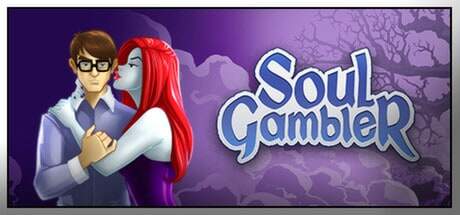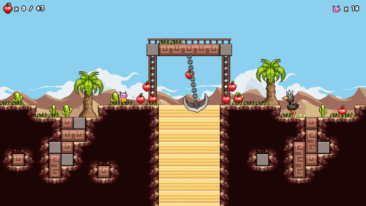Soul Gambler – What We Think:
An interactive graphic novel with light RPG elements, Soul Gambler from Brazilian developer Tlön Studios is a modern take on the classic Faust legend. The game re-imagines Faust as an office drone stuck in a dead end job, bored with his life until a strange encounter gives him the opportunity to make all his wishes come true. The price, of course, is his very soul.

Closer to a visual novel or a Choose Your Own Adventure book than a traditional adventure game or RPG, Soul Gambler offers a series of choices interspersed with illustrated bits of story and dialogue. Your various responses to multiple choice story options help determine how your character moves along the branching storyline and, ultimately, how the story will end.
Know When to Hold ’em, Know When to Fold ’em
The light RPG elements come in with the “soul gambling” mechanic. Early on in the game, you’ll make a pact (literally, a Faustian bargain) that will allow you to spend parts of your soul on various outcomes. These choices can range from prosaic (spend a percentage of your soul to finish all of your work so you can leave early) to the sleazy (exchange parts of your soul to attract women to you), to the desperate (escaping from jail). They’re also never necessary; it’s possible to make it through the game without deliberately sacrificing any of your soul.

The other RPG aspect is a series of four statistics—strength, intelligence, manipulation, and charisma—that you’ll choose at the beginning of the game. The way you distribute your points may make additional choices available during some parts of the story; put enough points in strength, for example, and you might be able to simply fight your way out of some situations.
Goethe ’nuff
Given the minimal “game” elements, Soul Gambler relies on its art and story. The art is solid, colorful and expressive, pleasantly cartoonish but not anime-inspired, which is a refreshing change for this style of game.

The story is compelling, especially at first, but gets convoluted the further you progress. Beyond the initial concept of “soul gambling,” the game throws weird twist after weird twist at you, bringing in everything from undead drug dealers to witches to reincarnation to the story at a pace that can feel a little overwhelming. It doesn’t help that there’s a lot of reliance on wordy exposition and explanatory dialogue; Soul Gambler’s storytelling mechanic could stand to hew closer to the old adage “show, don’t tell.”
The amateur translation from the original Portuguese doesn’t help, either. A lot of the dialogue is awkward and stilted to the point of distraction. If the conversation wasn’t so clumsy, the story would be a lot more immersive.

Worth Selling Your Soul?
In spite of some rough edges in its execution and the story itself, Soul Gambler is still an interesting game. While it’s short enough to play through in less than an hour, there are enough branches in the narrative to make a second and even a third play-through worth your while.
Unfortunately, it’s also had a lot of bugs, including a number of people on Steam who weren’t able to even get the game started. While the developers have been responsive on the Steam forums and sorted most of them out, I still encountered some issues getting the game to run, and it’s not compatible with Steam’s overlay or screenshot mechanism.
In the end, Soul Gambler is worth picking up if you’re a fan of interactive stories, and it’s a decent first effort for the developers, but it’s plagued by enough issues (both conceptual and mechanical) that it’s hard to recommend unreservedly.
Get Soul Gambler on Steam
[xrr rating=”2.5/5″]
Watch the trailer for Soul Gambler below:





